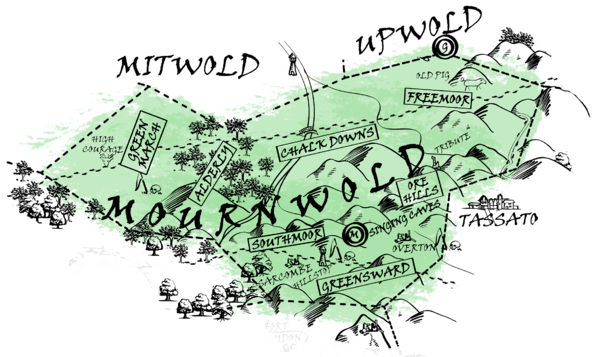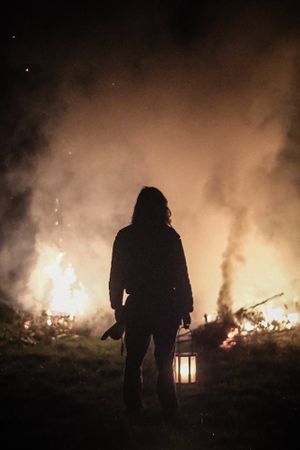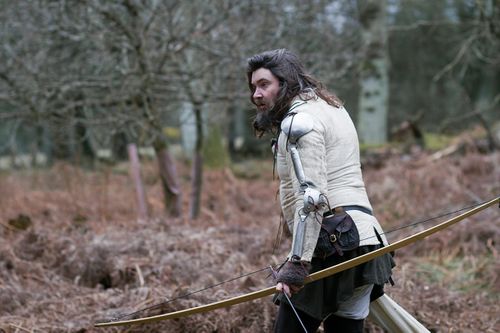Mournwold
The Mourn
This desolate land was known as the Mourn even before its final fall to the barbarian hordes in 349YE. Originally the name referred to the sound of the wind in the trees and across the craggy hills. Now it seems a more fitting name for the loss which Marcher folk feels at the March's passing. The conquest of Mournwold is fresh in the hearts and memories of many Marchers.
Whereas Upwold and Mitwold in particular are known for their sprawling farms, the rugged terrain of the Mourn is perhaps better known for its mines. The hills are riddled with rich veins of green iron, and with mine workings dedicated to extracting that ore. Prior to the invasion of the Jotun, there had been a growing tide of dissatisfaction among professional miners that all political power had been vested in the hands of those who owned farms. There were regular complaints that mine owners, like farmers and stewards, owned and worked land - the only difference was that the crops they raised was ore and stone rather than fruit, grain or vegetables. Most likely this dissatisfaction had its roots in certain sharp business practices by some of the lowland stewards, who set the prices for the food sold to the miners.
Recent History
The barbarian forces that eventually defeated the Marchers amassed for months in the forest to the west. Despite the Imperial forces that tried to turn them back, the horde was so numerous and ferocious that Mournwold was lost in pitched battle. As the troops withdrew heavy hearted from a battle they could clearly not win, the hordes did not pursue, they stayed in those hills and valleys, scurrying down the mines, slaughtering and devouring the cattle, defiling and tainting the holy places for their own dark ends. With the loss of the Mourn, the Marches has lost much of its mining.
The last Senator for Mournwold was Thomas Overton, who voluntarily entered the wicker man when the Mournwold was lost to the Jotun. His sacrifice was later echoed by that of Nedry Galest, General of the Tusks, who chose to enter the wicker man after the disastrous events of Spring 381YE.
After the Winter Solstice 381YE, the Greensward in southern Mourn was the site of some of the most terrible battles in recent Imperial history, when the Imperial host laid a trap for the Jotun armies. With powerful magical support, immense number of humans and orcs lost their lives and most of the structures in the Greensward were levelled including the town of Overton, and the castle of Orchard's Watch. At the same time, Spring plague and Winter magic accounted for perhaps a sixth of the remaining population, and half the people still living in the Greensward.
Major Features
The ruins of Overton
Once a sheep-farming town and market set on a hill, Overton was ruined early on in the great Battle for the Greensward. The majority of the defenders were killed refusing to leave their posts.
Ruins of Orchard's Watch
Commissioned by the Imperial Senate in Autumn 378YE, the fortification of Overton largely took place during the Jotun ceasefire. Work was overseen by Bridget Eastville, senator for Mitwold, and took place under the watchful gaze of Jotun scouts. The fortification consisted of solid walls around most of the town, with a central keep. A number of buildings damaged by Jotun raids were cleared, and apple trees planted in their place - a memorial to those Marchers who had die fighting for the Empire. The keep has largely incorporated the old fortified manor house that served as a stop-gap - and still serves as a base of operation for scouts gathering information about Jotun activity in the territory.
During the great Jotun offensive after the Winter Solstice 381YE, following several seasons of concerted attacks, the castle was leveled by orc siege engines. The memorial apple orchard burned during the fall of Overton - it is not known which side set the fire that consumed it.
The Singing Caves
The Singing Caves are a Bourse resource located on the Greensward near Overton. Custodianship of the Caves is an Imperial Title that brings with it a Seat on the Imperial Bourse. It produces 28 Imperial wains of mithril every season. Control is allocated to any Imperial citizen by open auction during the Autumn Equinox.
Regions
Alderly
Quality: Forested
A forest of old oak and sycamore. Marcher faerie tales tell of diminutive creatures who hide beneath the trees and prey on unruly children - references to a hidden Feni enclave deep in the woods. The Feni of Alderly occasionally raid into Green March, Chalkdowns, and Golden Downs, but for the most part they keep to themselves. During the Jotun occupation, the deep woods were conquered only in theory - the Jotun controlled the grasslands beyond the forest, and the edges of the woodlands, but they did not go too deep. Likewise, when the Empire liberated the region in 381YE, they faced opposition from the Feni and settled for driving the Jotun out and claiming the lighter woodlands and the fields, rather than risk pushing too far into dangerous territory in the deeper woods.
The Marchers who live in the forest have always been considered peculiar, and three decades of isolation has intensified their strangemness. Insular and uncommunicative, the hamlets and small villages of charcoal burners and woodcutters have more than a little Feni blood, and there is some question whether the Alderly folk are even truly Marchers anymore. Regardless, however, they are still Mournwolders.
Chalkdowns
A land of rolling chalk downland with close-cropped turf and dry valleys, the people of the Chalkdowns are perhaps the closest to what an outsider thinks of when they imagine Marchers. They have their own peculiarities, however. The yeomen practice a distinctly Mourn form of agriculture, combining raising corn and raising sheep, whose droppings help to fertilise the cornfields when they are not grazing on the springy Mournwold turf.
Due to their emphasis on farming, the yeomen of the Chalkdowns had a somewhat disproportionate level of influence over the Mournwold, and involvement in the politics of the Marches and the Empire alike. Perhaps as many as a half of all senators for the Mournwold were picked by stewards from Chalkdowns in the 275 years that the Mournwold was part of the Empire. This made the Chalkdowns prosperous, and the yeomanry wealthy, but it also lead to a simmering resentment from the miners of Ore Hills and Southmoor. During the Jotun occupation the taxes claimed by their orc overlords impoverished even the richest, most stubborn farmers. With the Imperial liberation, it is likely that some of the yeomen who fled north (or their children) will want to return. Unfortunately, many of the farms that once belonged to them are now in the possession of former Jotun thralls (both human and orc), which is likely to lead to even more problems in the coming years.
Freemoor
The wildest part of the Mournwold, Freemoor is split roughly between scrubby farmland in the west and wooded valleys in the east. The folk here had a reputation for being stand-offish on par with the people of Bregasland, especially those who preferred the gentle hills and woodlands of the west. There are two well-known landmarks in Freemoor: Old Pig, an aptly named chalk figure carved into the hills of the wold; and The Whittle Hill, the largest hillock in the western Mournwold.
Green March
Near the border with Bregasland is the odd monument called High Courage. Looking down across the moors towards Liathaven, it is a large statue of a stag with broken antlers, ascribed to the people of Terunael. On a stone block at the base of the statue Imperial letters simply read “High Courage” but it is clear that they are more recent than the statue itself.
Greensward
The Greensward remains the last holdout of Imperial presence in the Mourn. The refugees and survivors who set up camp at Overton are gone along with the town. Greensward Monastery, the abbey that once served to keep the morale of the defenders high, is now a burnt out shell amid the foothills of Kahraman. The soil itself is said to have become sodden with the sheer amount of human and orc blood shed during the battles over the grasslands.
Keywords: Tens of thousands of humans and orcs died fighting in the Greensward, and these deaths have soured the earth here. Like parts of Kallavesa and the Necropolis, the Greensward has the haunted quality. The same battles saw almost every town, farm, and other building in the Greensward reduced to rubble, giving the Greensward the ruined quality.
Ore Hills
The ore hills (sometimes rendered, unsurprisingly, as "our hills" in the drawling dialect favoured by the natives) are riddled with mine workings and quarries. The hills are generally rich in veins of green iron, but the Ore Hills are site of some of the most prosperous mines in the Mourn. Some of the older mines here have a bad reputation, and feature regularly in Marcher ghost-stories and cautionary tales. According to these stories unnatural things are occasionally sighted in the deepest parts of the oldest mines. Details are never clear and many sensible people dismiss them as either fantasy brought on by too much time without sunlight, or else ascribe the sightings to trogoni.
Keywords: Hilly
Southmoor
The last region to fall to the Jotun so far, Southmoor is the location of Sarcombe. A ruin now, it was once a prosperous mining town, rich off the back of trade in green iron. Refugees from Sarcombe mostly went east to Overton. There is believed to be a major Jotun encampment here, keeping a careful eye eastward to the Greensward - and beyond to Temeschwar.
Keywords: Hilly
OOC Note
- As of the beginning of the Winter Solstice 381YE, the Marchers control the entire territory except for Greenmarch and Southmoor, which remain in Jotun hands. The territory is thus Imperial once more.
Jonah Gold
Jonah Gold is a possibly-legendary figure whose story dates from the time of the Cousins' War. Jonah is said to to have been born in the Ore Hills long before the Mournwold was part of the Marches proper; in some versions he is the son of a Tassatan immigrant and a Marcher sheep herder. Stories say that Jonah was a miner who quarried out metal of such quality that his weapons turned the tide of war for his household during the short-lived Marcher civil war. A jealous friend betrayed him to the enemy, and for a heavy purse of coin staged a mining accident that trapped him behind a rockfall where he presumably perished. Over the centuries, a number of legends and stories have been attributed to Jonah - if the man had participated in all the stories attributed to him he would have been so busy moving around the Marches, southern Wintermark. and northern Brass Coast he would never have had time to do any actual mining!
His stories do not end with his death. His ghost is said to haunt the mines of the Marches, especially the green iron mines of the Mournwold. Superstitious miners say that to see Jonah Gold presages disaster - whether his appearance causes a catastrophe reminiscent of the collapse that killed him, or if he simply warns against them varies from legend to legend and place to place. There are even a few stories of sightings of what sounds a lot like Jonah Gold in the hills of Kahraman, and the old mines north of Tassato.
Some scholars who have taken the time to study the stories of his ghostly appearance disagree with the accepted wisdom that Jonah Gold is a ghost. While there is plenty of precedence for so-called "warning ghosts", these scholars argue that the sightings are actually of an astronomantic tulpa rather than a restless spirit - but their argument is undermined by an inability to agree on which constellation the tulpa represents.
Jonah's name has also been given to a variety of apple commonly grown in the Mournwold. Heavy, green and sweet, with a sharp bite, the "Jonah Gold" variety is used extensively in cooking sweet pies and apple sauce, and traditionally is buried with miners from the Mourn, particularly those who quarry green iron.
His story is immortalized in the popular song that bears his name.

